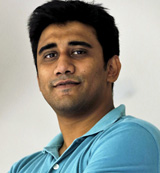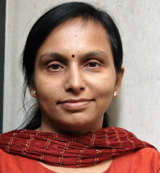Asia-Africa Online Training Programme: Making Data Speak - Demystifying AIR QUALITY and PUBLIC HEALTH Data for Effective Communication
Registration Closed
DATES: December 6 - 20, 2021
DURATION: 15 hours
PLATFORMS: Moodle and Zoom
According to the World Health Organization (WHO), air pollution is the world's greatest environmental risk to health: it kills an estimated seven million people worldwide every year. Over 91 per cent of us live in areas where air pollution exceeds the guidelines considered to be safe; nine out of 10 people breathe polluted air each day; and 4.2 million premature deaths occur each year as a result of exposure to air pollution. The State of Global Air Report, 2020 says it is the fourth leading risk factor for early deaths worldwide. In fact, more than 90 per cent of the world’s children breathe toxic air every day.
While governments and countries across the world acknowledge this deadly killer and its potential to wreak havoc and reel off statistics, it is critical to understand the numbers and what they really tell us – only then can we communicate effectively about the state of the air we breathe, the scale of the problem or its key causes, the health and societal impacts, and what actions are needed to control it. Evidence-based communication, using data, is key to informing air quality interventions and saving lives.
Centre for Science and Environment (CSE), one of South Asia’s leading think tanks on the politics of development, environment and climate change, invites you to join its Global Online Training Programme which focuses specifically on one critical aspect of meeting this challenge: understanding air pollution and health data, analysing it, and using it to communicate and tell stories on the urgency of this “environmental and health crisis”.
The programme is designed to inform about established as well as new trends and approaches in data-driven development communications for effective presentation and maximum impact. It will also introduce popular analytical tools and conceptual frameworks, and offer insights into the legal framework and politics to better understand numbers on air pollution, health and economy.
What will you learn?
- Data collection: Learn how and where to research for relevant data on air pollution, health and related indicators on development.
- Data analysis: Develop skills to analyse and interpret trends on air pollution, health, the science and the impacts.
- Data visualisation: Learn to visualise data for effective communication.
- Report writing: Develop skills to process, visualise and transform “air pollution and health” data into simple, compelling and informative ‘messages”, “reports”, “communication collaterals” and stories for print and web.
Who can attend?
- Professionals, consultants, planners, practitioners, government officials and policymakers working on clean air and health. This includes international organizations working for low and middle income countries especially Africa
- National and international civil society groups, NGOs, clean air activists and advocates designing awareness programmes on air quality and health
- Academia: Faculty and researchers, and students associated with sustainable development, air pollution and health
- Researchers and writers on urbanization
- Environmental consultants
- Public relations/communication officers
- Data managers and statisticians interested in improving communication skills
- Anyone else interested in the subject
COURSE STRUCTURE
The self-paced online programme will have video lectures, presentations, tutorials, quizzes and assignments. Participants will also get an opportunity to work on an in-depth project of their choice. The programme will also have three live interactive sessions for meeting the trainers and fellow participants.
The programme has been designed in such a way that it can be completed along with a regular job or study.
The course is broken down into five modules:
- Module 1: Understanding challenges of urbanisation, air quality and health impacts
- Module 2: Data for effective communication and informed decision making on air quality and health risks
- Module 3: Finding the right data on air quality, health and development
- Module 4: Data processing and analysis to make data meaningful
- Module 5: Data visualisation
All those who attend and complete the course will be assessed by the course coordination team. CSE and AAETI will award Certificates of Participation to all those who attend and complete the course.
COURSE DIRECTOR
Kiran Pandey
Programme director, Information Management, CSE
Email: kiran@cseindia.org
Phone: +91-9871215338
COURSE COORDINATOR
Susan Chacko
Manager,
Information Management, CSE
Email: susan@cseindia.org
| Flyer | |||||||||||||||||||||||
 |
|||||||||||||||||||||||
| Download pdf | |||||||||||||||||||||||
| COURSE DATE | |||||||||||||||||||||||
| December 6 - 20, 2021 | |||||||||||||||||||||||
| COURSE PLATFORM | |||||||||||||||||||||||
| Zoom and Moodle | |||||||||||||||||||||||
| COURSE DURATION | |||||||||||||||||||||||
| 15 hours | |||||||||||||||||||||||
| COURSE FEE | |||||||||||||||||||||||
| Rs 3,500 for Indian participants US $100 for Global participants |
|||||||||||||||||||||||
| Speakers | |||||||||||||||||||||||
| Dr D D Basu Advisor, Industrial Pollution, CSE and Ex-Additional Director, Central Pollution Control Board (CPCB) BIO |
|||||||||||||||||||||||
 |
Anumita Roy Chowdhury Executive Director Right to Clean Air Campaign, CSE BIO |
||||||||||||||||||||||
 |
Richard Mahapatra Managing Editor of Down To Earth magazine. BIO |
||||||||||||||||||||||
 |
Vivek Chattopadhyay Programme Manager Right to Clean Air Campaign, CSE BIO |
||||||||||||||||||||||
 |
Shambhavi Shukla Deputy Programme Manager, Right to Clean Air Campaign, CSE BIO |
||||||||||||||||||||||
 |
Rajit Sengupta Assistant Editor Copy, Down to Earth magazine BIO |
||||||||||||||||||||||
 |
Kiran Pandey Programme Director, Environment Resources Unit, CSE BIO |
||||||||||||||||||||||
| Testimonials | |||||||||||||||||||||||
|
|||||||||||||||||||||||

 "Structuring, processing, analysing and presenting information with visuals was the most interesting part of the workshop. The content and methods are useful for our work on data management, analysis and presentation. We are developing factsheets on status of land, agriculture etc. This training is useful to develop these factsheets better."
"Structuring, processing, analysing and presenting information with visuals was the most interesting part of the workshop. The content and methods are useful for our work on data management, analysis and presentation. We are developing factsheets on status of land, agriculture etc. This training is useful to develop these factsheets better."  "In a government set up we used to work in traditional ways, the workshop gave us an opportunity to learn new things which we can apply in our workplace with regard to using of data in an effective manner."
"In a government set up we used to work in traditional ways, the workshop gave us an opportunity to learn new things which we can apply in our workplace with regard to using of data in an effective manner." “This course is fantastic platform for national and international NGOs in the changing environment”
“This course is fantastic platform for national and international NGOs in the changing environment”  “Decoding data, designing and visualising stories was an excellent exercise giving insights about the impactful ways of communication”
“Decoding data, designing and visualising stories was an excellent exercise giving insights about the impactful ways of communication”  "Learnt how and where to research for relevant data. The course was highly professional and featured a lot of experts."
"Learnt how and where to research for relevant data. The course was highly professional and featured a lot of experts." “The training was impactful as it has given me reasons to improve my skills on data visualization”
“The training was impactful as it has given me reasons to improve my skills on data visualization” “I will be able to create impactful visualisations for some of our survey data. I will prioritise the house survey, the Annual Agricultural Survey, the Key Economic Indicators and the COVID-19 business survey. I can plan for bi-monthly infographics on the available data sources”
“I will be able to create impactful visualisations for some of our survey data. I will prioritise the house survey, the Annual Agricultural Survey, the Key Economic Indicators and the COVID-19 business survey. I can plan for bi-monthly infographics on the available data sources” “The topics and techniques covered in this course will be used in my routine work as a journalist and a student during research, production of reports and presentations. I will be able to design a similar training particularly for fellow journalists and research students in various academic fields in West Africa and elsewhere”
“The topics and techniques covered in this course will be used in my routine work as a journalist and a student during research, production of reports and presentations. I will be able to design a similar training particularly for fellow journalists and research students in various academic fields in West Africa and elsewhere” “It is a training that empowers all for dissemination of global developments and data. I would recommend it to anyone especially media practitioners, civil society and young professionals in all spheres of life”
“It is a training that empowers all for dissemination of global developments and data. I would recommend it to anyone especially media practitioners, civil society and young professionals in all spheres of life”
Share this article